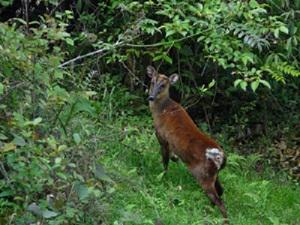Roshan Patrick Rai
Other projects
29 Apr 2013
Community-Based Mitigation of Human-Wildlife Conflict around the Singalila National Park, India II
18 Apr 2016
Community-Based Mitigation of Human-Wildlife Conflict around the Singalila National Park, India III
This project aims to understand the extent and intensity of HWC in SNP and hope to identify and initiate community-based initiatives to reduce impacts of human wildlife conflict.

Human wildlife conflict (HWC), a key stake, for communities in the fringes of Singalila National Park (SNP), India, was strongly expressed by 5 forest villages in the existing work supported by CEPF which was not included in the project. 13 species destroy crops in these communities with Samanden being hardest hit with all the 13 species destroying upto 40% of the crops and livestock (focus group discussion 2010). Communities use traditional methods like night vigil, scarecrow, catapult; noise and fire to deter predators. HWC deters participation of communities in conservation including bringing antagonism. Therefore the proposed project is aimed at helping the communities cope with this unaddressed livelihood stress which is their key stake. It is anticipated that a project of this nature will go a long way in conserving this important transboundary site between India and Nepal.

HWC will be studied intensively with Samanden as the field site. The study will also collate information at the landscape level from the Forest Department, Universities and other NGOs. The study will add to the HWC knowledge base of patterns, causes and management of the conflict. It will help in highlighting the issue as well as sensitise various stakeholders and advocate for compensation which is not available for HWC in the hills.
Importantly, it will draw out improvement on the existing management practices and institutions. Piloting these practices will increase protection of crops and livestock. The protection and mitigation management practices will focus on adoption of sustainable livelihood options which will add value to the immediate village agro-biodiversity. These interventions will bring benefits to the communities providing them incentives to reduce the pressure they exert on forests. The study and pilot interventions will be community based enabling the Forest villagers to become active participants in conservation with strengthened community institutions making it more sustainable. Documentation will be shared with stakeholders increasing knowledge base as well as for advocacy on human wildlife conflict.
The proposed piloting of community based mitigation strategies is expected to have immediate relevance to similar landscapes in other regions. The overarching impact expected by this project is decrease in habitat fragmentation within SNP as well as contiguous forest corridors spanning two countries (India-Nepal) or states in India (West Bengal and Sikkim). This in turn is expected to reduce the isolation of many protected areas within this important transboundary landscape.